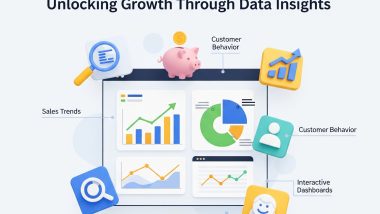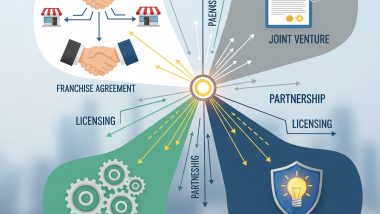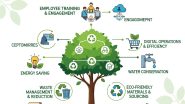Entrepreneurship is a journey that begins with a vision and passion to create something new.
An entrepreneur is someone who takes risks, accepts challenges and builds a business from the ground up.
In today's fast-paced economy, entrepreneurs drive innovation, create jobs and contribute to economic growth.
If you've ever wondered what it means to be an entrepreneur and how to start this exciting journey, this blog will provide you with the insights and steps you need to start your entrepreneurial path.
What Does It Mean to Be an Entrepreneur?
An entrepreneur is not just a business owner; it is someone who has the vision, courage and determination to bring new ideas to life. Entrepreneurs are problem solvers and innovators who seize opportunities and take calculated risks. They constantly look for ways to improve existing products or services or create entirely new products.
While a business owner manages an existing business model, an entrepreneur is someone who builds a business from scratch, often introducing new solutions, techniques or approaches. The entrepreneurial mindset involves flexibility, adaptability and a willingness to learn from failure.
Benefits of Being an Entrepreneur (With Examples)
Becoming an entrepreneur comes with its own set of rewards. Here are some of the key benefits:
- Financial Independence: Entrepreneurs have the potential to achieve financial freedom and control their earnings. Fixed salaries do not bind them and can be earned based on the success of their business. For example: Elon Musk, the founder of companies like Tesla and SpaceX, started with innovative ideas and has become one of the wealthiest individuals in the world due to the exponential growth of his businesses.
- Freedom and Flexibility: Entrepreneurs have the freedom to set their schedules and work on their terms, allowing for a better work-life balance and the ability to pursue personal interests. For example: Sara Blakely, founder of Spanx, started her business from her apartment. As the company grew, she was able to maintain flexibility in her schedule, balancing her professional and personal life as a mother and entrepreneur.
- Personal Growth and Development: The entrepreneurship journey pushes individuals to develop new skills, overcome challenges, and grow beyond their comfort zones. This continuous learning helps build leadership, resilience, and confidence. For example: Oprah Winfrey, who built her media empire, constantly adapted and developed new skills throughout her career. From hosting shows to managing her production company, she evolved as a leader and a brand.
- Opportunity to Make an Impact: Entrepreneurs have the power to solve real-world problems, create jobs, and make a meaningful impact on society and the environment. For example: Muhammad Yunus, founder of Grameen Bank, introduced microfinance to empower underserved communities, especially women, in developing countries. His entrepreneurial efforts created opportunities for millions of people to rise above poverty.
- Unlimited Creativity and Innovation: Entrepreneurs have the freedom to innovate, experiment with ideas, and bring their visions to life. They are not confined by traditional corporate structures, allowing them to create unique products and solutions. For example: Steve Jobs, co-founder of Apple, continuously pushed the boundaries of technology and design, creating revolutionary products like the iPhone and iPad that reshaped the tech industry.
- Building a Legacy: Entrepreneurs can build something that lasts beyond their lifetime. A successful business can create a lasting legacy that impacts future generations. For example: Walt Disney created an entertainment empire that continues to bring joy to millions worldwide. His vision and creativity left an enduring legacy, with Disney becoming one of the largest entertainment companies globally.
Challenges Entrepreneurs Face (With Examples)
Despite the rewards, entrepreneurship is not without challenges:
- Uncertainty and Risk: Entrepreneurs face the uncertainty of market conditions and the risk of failure. They must make decisions without guarantees of success, which can be stressful and challenging. For example: Jeff Bezos, founder of Amazon, initially faced doubts about the viability of an online bookstore in the 1990s. Despite skepticism, he took the risk, and Amazon grew into one of the world's largest e-commerce platforms. However, the early stages involved a lot of uncertainty, including financial losses and logistical challenges.
- Financial Constraints: Accessing funds and managing finances can be difficult, especially in the initial stages when revenue may be limited. Entrepreneurs often have to seek external funding or bootstrap their businesses. For example: Jan Koum, co-founder of WhatsApp, faced financial difficulties when starting the company. He had limited resources and relied on personal savings and early investor support to build the app. The journey involved significant financial constraints before WhatsApp eventually became a billion-dollar acquisition for Facebook.
- Time Management and Work-Life Balance: Entrepreneurs often juggle multiple roles, such as managing operations, marketing, and finances. This multitasking can lead to long hours and difficulty maintaining a work-life balance. For example: Elon Musk, known for leading multiple companies like Tesla and SpaceX, manages several responsibilities simultaneously. His intense schedule and commitment to his ventures have resulted in long working hours and the challenge of balancing his professional and personal life.
- Competition and Market Fluctuations: Entrepreneurs must navigate intense competition and adapt to changing market conditions. Staying relevant and ahead of competitors requires innovation, quick decision-making, and flexibility. For example: Howard Schultz, former CEO of Starbucks, faced competition from other coffee chains and fluctuating market trends. To maintain Starbucks' market leadership, he focused on reinventing the brand and improving customer experience, which required constant innovation and strategic thinking.
- Finding and Retaining Talent: Building the right team is critical for business growth, but attracting and retaining skilled talent can be challenging, especially for startups competing against larger, established companies. For example: Jack Ma, founder of Alibaba, initially struggled to find and hire talented individuals willing to join a startup in China’s tech industry. Despite these challenges, he built a strong team that believed in his vision and ultimately contributed to Alibaba’s success.
- Regulatory and Legal Hurdles: Entrepreneurs must navigate complex legal and regulatory requirements, which can vary by industry and region. Compliance can be time-consuming and costly, especially for startups with limited resources. For example: Travis Kalanick, co-founder of Uber, faced legal challenges in various countries as the company disrupted traditional taxi services. Uber had to navigate regulations and, in some cases, lawsuits, which required significant resources and strategic adaptation.
- Coping with Failure and Rejection: Entrepreneurs often face failures, setbacks, and rejection along their journey. Resilience is required to bounce back and learn from these experiences. For example: Thomas Edison, inventor and founder of multiple ventures, faced thousands of failures before successfully inventing the light bulb. His resilience and determination to learn from his mistakes illustrate the perseverance required to overcome entrepreneurial challenges.
How to Get Started as an Entrepreneur
Starting as an entrepreneur requires careful planning and a strategic approach. Here’s a step-by-step guide:
- Identify Your Passion and Skills: Determine what excites you and aligns with your strengths. Passion combined with skill increases your likelihood of success.
- Conduct Market Research: Understand the market, your target audience, and competitors. Identifying gaps and opportunities is essential for building a viable business.
- Develop a Solid Business Plan: Outline your business model, vision, mission, goals, and strategies. A comprehensive business plan acts as a roadmap and helps secure funding.
- Secure Funding and Resources: Explore various funding options like personal savings, bank loans, angel investors, or crowdfunding platforms. Ensure you have sufficient resources to start and sustain your business.
- Build a Support Network: Surround yourself with mentors, advisors, and a reliable team. Networking is crucial for gaining insights, support, and potential partnerships.
- Test and Validate Your Idea: Develop a prototype or MVP (Minimal Viable Product) and seek feedback. Validation helps refine your product or service and ensures it meets market needs.
- Launch Your Business: Execute your plan, focusing on marketing, branding, and customer acquisition strategies. Monitor progress, adapt to feedback, and make improvements as needed.
- Manage Growth and Scale Up: As your business gains traction, focus on scaling operations and managing growth efficiently. Continuously innovate and adapt to market changes to stay competitive.
Types of Entrepreneurs
There are various types of entrepreneurs, each with unique motivations and business models:
- Freelancer: Someone who offers services independently, often in creative or technical fields.
- Startup Founder: An entrepreneur who builds a business from scratch, often with an innovative product or service.
- Social Entrepreneur: Someone who uses business as a means to create social impact and solve societal problems.
- Womenpreneur: Female entrepreneurs who break traditional barriers to start and manage businesses.
- Solopreneurs: Individuals who run their businesses alone, handling all aspects from management to execution.
- Manufacturer: Entrepreneurs who create products and bring them to market.
- Retailer: Entrepreneurs who sell products directly to consumers, either online or through physical stores.
Key Steps to Launch Your Entrepreneurial Journey
Here are the essential steps to launching your business successfully:
- Set Clear Goals: Define your objectives and plan short-term and long-term strategies.
- Test and Validate Your Idea: Use feedback and research to validate your concept and refine your business model.
- Launch an MVP: Start with a minimal viable product to test the market and gather insights.
- Focus on Marketing and Branding: Develop a strong marketing strategy and brand identity to attract and retain customers.
- Scale Up: Once your business gains traction, focus on scaling operations, managing growth, and expanding your reach.
Frequently Asked Questions (FAQs).
- What is the first step in becoming an entrepreneur?
Ans: The first step is identifying your passion and skills. Combining what you love with what you’re good at increases your chances of success.
- How do entrepreneurs secure funding for their businesses?
Ans: Entrepreneurs can secure funding through personal savings, loans, crowdfunding, or seeking angel investors or venture capital.
- What skills are essential for entrepreneurs?
Ans: Critical skills include problem-solving, time management, adaptability, leadership, and effective communication.
- How can entrepreneurs overcome financial challenges?
Ans: Entrepreneurs should create a financial plan, seek multiple revenue streams, and manage costs efficiently. Accessing business loans or grants can also help.
- Is entrepreneurship risky?
Ans: Yes, entrepreneurship involves risks such as market competition, financial instability, and uncertainty. However, successful entrepreneurs manage these risks through strategic planning and adaptability.
Becoming an entrepreneur is both a rewarding and challenging journey. Following the steps outlined in this blog and staying committed to continuous learning, you can set yourself up for entrepreneurial success.


















